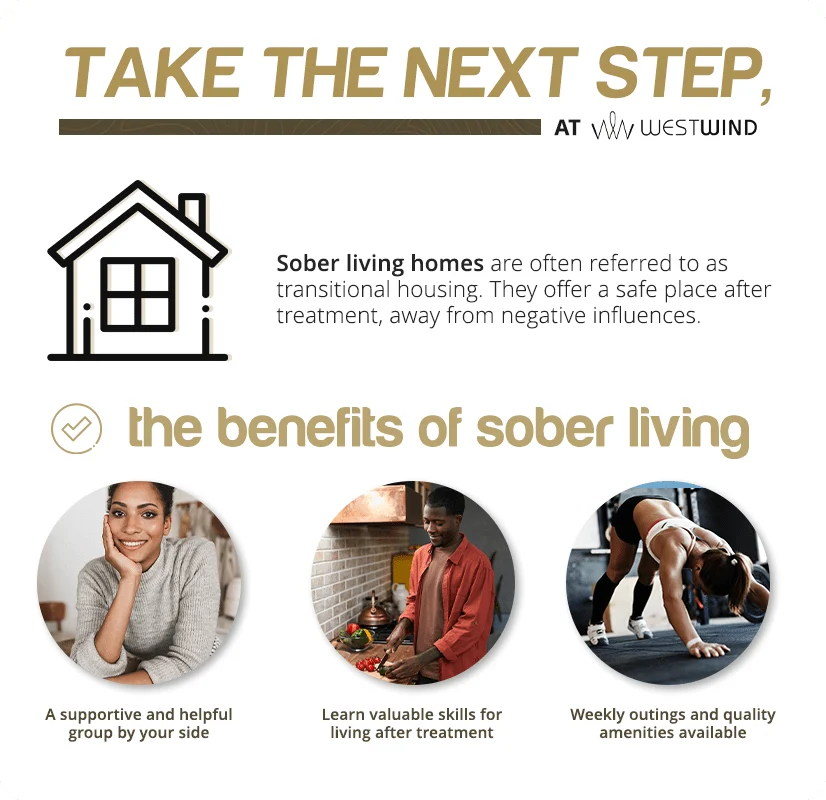Transitioning into the real world as a newly sober individual can be challenging. You might not have the support you need from friends or family or might be looking for work or stable housing. Thankfully, there are sober living programs available that can provide you with the support and stability you need as you work to rebuild your life.
Sober living homes are residences that you can move into once you complete an addiction treatment program. It is a stepping stone, in a sense, for your transition back to a normal routine. A sober house provides you with a high level of support and guidance as you find your way back to independence. In other words, it is a safe way to get back on your feet.
At Westwind Recovery®, we provide sober living programs in Los Angeles and a PHP addiction treatment to support our drug and alcohol addiction treatment programs. Once you have learned more about what to expect from sober living, reach out to our addiction treatment center to begin your journey to recovery with all the tools and resources you need.

Sober Living Homes Offer Structure
Perhaps one of the most important things that you can expect in a sober home is structure. With many things in life, having a sense of structure is a way to set boundaries. When you are in recovery, having strict boundaries can mean the difference between relapse or success.
You will find that there are rules that must be followed in order to remain in the home. These might include:
- No drugs or alcohol (except random drug tests).
- No overnight guests.
- Adherence to a curfew
- No sleeping outside of the home.
- Attendance at meetings and groups, both inside and outside the home.
- No stealing or destruction of property.
- No violence.
- Participating in goal setting and taking steps to secure employment or further your education.
Living in the real world without this structure puts you at risk of breaking your own rules. That is why the structure and rules are strongly enforced.
Chores and Responsibilities in Sober Living Homes
When you integrate back into society as a newly sober individual, you will have responsibilities. You will need to maintain a place to live, and you’ll need to know how to cook, clean, do laundry, and so forth.
Chores are a part of living in a sober house and should be expected. Not only will they give you a sense of responsibility, but living with others — and each being responsible for something — helps you learn how to work with others for the greater good of everyone.
For example, many sober homes require you to take turns cooking dinner for the residents in the home. While you are cooking, someone else may do the dishes. Another person may set the table or take out the trash.
The Role of Community in Recovery
Living with others will provide you with a sense of community and belonging. In a sober living home, you will share a space with other individuals in recovery. Be prepared for the fact that overcoming struggles can make your bonds with one another stronger.
Before you know it, you will want to see your housemates succeed – just as they want you to do the same. The dynamics begin to resemble those of a family, including the good, the bad, and the ugly.
There will likely be arguments and struggles, but there will also be celebrations and achievements. You will grow closer with everyone you live with, and they will become a beacon of support for the future.
Consistent Support for Your Recovery Journey
Imagine having support at every turn in your recovery. You can expect to find this in a sober living home.
Keep in mind that the idea is to get you on your feet by becoming a responsible, structured member of society. So, don’t expect those around you to hold your hand every step of the way – as this would only hinder you. Rather, you will have cheerleaders who will teach you the tools you need to accomplish anything that comes your way.
For example, this support could come in the form of:
- Resume writing and job interview skills.
- Completing school applications.
- Learning to handle financial matters, such as setting a budget, paying bills, writing checks, or maneuvering online banking.
- Weekly or daily support group meetings with your housemates. This teaches you to overcome disagreements in a positive manner, as well as how to become a means of positive support to those around you.
Expect this support to carry into your life long after you leave the sober living home. The bonds and friendships you create can have a positive impact on your future.
Reach Out to Westwind Recovery®® for a Sober Living Program in Los Angeles
Westwind Recovery®®’s sober living homes in Los Angeles provide upscale residences for those who are in our outpatient programs or those who are rebuilding their lives in recovery. Connect with our team today at 855.340.8832 or reach out online to learn more.

Dr. Deena is the Chief Clinical Officer of Westwind Recovery®, an award-winning outpatient treatment center in Los Angeles where she oversees the clinical and administrative program and treatment methods. Dr. Deena is a doctor of psychology and licensed clinical social worker since 1993. LCSW #20628. Originally from the East Coast, Dr. Deena has worked running treatment centers, worked as a therapist in psychiatric hospitals as well as school settings and currently has a thriving private practice in the LA area. Dr. Deena has appeared regularly on the Dr. Phil Show as an expert since 2003. She has also been featured on many other TV shows, podcasts and has contributed to written publications as well as podcasts.




